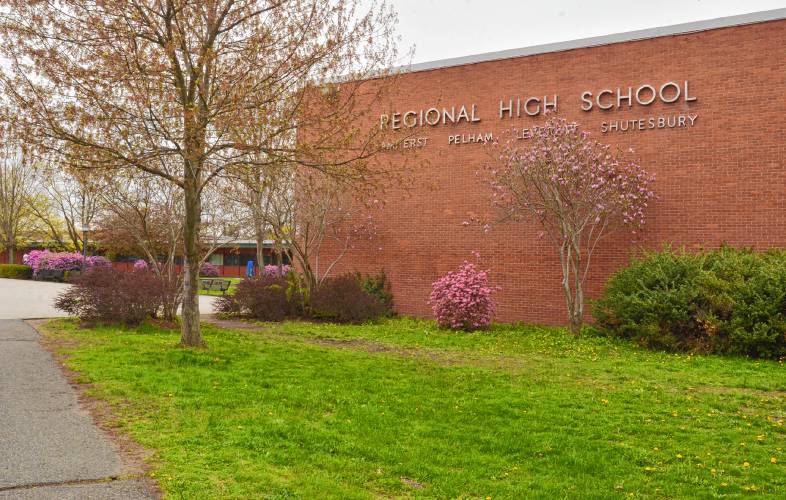Amherst Regional school board reaffirms job-saving budget

Amherst Regional High School. STAFF FILE PHOTO
| Published: 04-01-2025 4:43 PM |
AMHERST — State education officials were crystal clear with the Amherst Regional School Committee on Monday night, warning members that they are not to vary from an agreement that determines how much each of the district’s four member towns must pay each year.
Taking the warning to heart, the committee opted to stick with a $37.08 million fiscal year 2026 budget proposal that aims to preserve most current staffing.
But being bound to the Regional School District Agreement formula that considers a community’s wealth and student enrollment when calculating assessments for each member town means that huge assessment increases would be brought to the annual Town Meetings in Pelham and Leverett next month. A sizable assessment jump also will be considered at Shutesbury’s annual Town Meeting, and the assessment for Amherst would remain above the 4% guidance set by the Town Council.
In a 7-2 vote Monday, the committee reaffirmed an earlier vote to present an operating budget that is $812,126 short of the $37.89 million needed to maintain level services, but represents a $1.81 million increase over this year’s $35.27 million budget. The proposal ensures four middle school teachers and two high school counselors would not lose their jobs, preserves both the Prep Academy and world languages, and is recommended by Superintendent E. Xiomara Herman as having the least impact on secondary education.
Amherst representative Jennifer Shiao said the budget is the best option due to what it maintains, while understanding that school leaders aren’t able to use an alternative assessment method, in which more of the burden would be put on Amherst, and guardrails would prevent any town from having more than a 6.5% year-over-year assessment increase.
“It looks really painful for Pelham, Leverett and Shutesbury, but I don’t see any way around it,” Shiao said.
For Pelham, the $1.31 million assessment is 23%, or $244,807, higher than this year’s $1.07 million assessment, while Leverett would see a 14%, $230,356, increase from $1.63 million to $1.86 million.
Shutesbury’s assessment would be up 7.7%, or $126,620, from $1.65 million to $1.78 million. Amherst’s increase, at 4.8%, or $905,670, would bring the town’s assessment to $19.74 million, from $18.84 million.
Article continues after...
Yesterday's Most Read Articles
 Long-vacant former Faces spot in Northampton gets new tenant
Long-vacant former Faces spot in Northampton gets new tenant
 Here come the sweetness: Four new businesses prepping to open in downtown Northampton
Here come the sweetness: Four new businesses prepping to open in downtown Northampton
 Local ‘Hands Off!’ standouts planned as part of national effort
Local ‘Hands Off!’ standouts planned as part of national effort
 Area property deed transfers, April 4
Area property deed transfers, April 4
 Hatfield Select Board removes elected Housing Authority member
Hatfield Select Board removes elected Housing Authority member
 Shutesbury reviewing how to improve safety on Lake Wyola in wake of accident last summer
Shutesbury reviewing how to improve safety on Lake Wyola in wake of accident last summer
Committee Chairwoman Sarahbess Kenney, who is one of Pelham’s two representatives, said her understanding is that Pelham officials will recommend the large increase to Town Meeting, as they have a preference for getting back to the statutory method after years of moving away from it.
Shiao and Kenney were joined in supporting the budget by Pelham representative William Sherr, Shutesbury representative Anna Heard and Amherst representatives Sarah Marshall, Deb Leonard and Bridget Hynes.
Voting against the budget were Amherst representative Irv Rhodes and Leverett representative Tilman Wolf. Rhodes said he is concerned Amherst Town Council won’t support the higher town assessment, and Wolf said a slightly smaller budget would be a “tad less painful” to his town.
The three smaller towns must approve the budget at Town Meetings, along with the Amherst Town Council, for it to go into effect on July 1.
The need to take another vote on the proposed budget came after Town Council rejected an alternative way of calculating assessments at its March 24 meeting.
The committee also had to make its latest budget recommendation by Monday at 11:59 p.m., because the regional agreement requires its decision no later than March 31.
While the four towns had given approvals to revised assessment methods in recent years, with subsequent approvals from the commissioner of the Department of Elementary and Secondary Education, Herman said the Town Council’s vote ended that possibility. “This year, we’re not as lucky,” Herman said.
But state officials indicated that state approval may not have been forthcoming anyway, as regional school leaders are supposed to abide by the statutory method, and only use an alternate assessment method if it’s outlined in the regional agreement.
Jay Sullivan, associate commissioner for District and School Finance for the state education department, said that after several years of having assessments calculated on a one-year basis, the Amherst-Pelham Regional Schools were in a bad situation because no alternative formula has ever been written into the regional agreement.
“We’ve let the district slide many years in a row,” Sullivan said, explaining that not only is this problematic, but the requests from the administration came in well after the Dec. 31 deadline for approving any changes to the statutory method.
Michelle Griffin, a representative from the state education department’s Office of Regional Governance, said the statutory method is always available, but an alternative method should only be allowed if it’s embedded in the regional agreement.
Only the statutory method or one alternative method are allowed by the state, not an annual negotiation between the towns on a revised formula, said Christine Lynch, also a representative from the state education department’s Office of Regional Governance.
“You hope every year,” Lynch said, adding that it’s been “a dangerous method to use, and has no basis in (state) law.”
Herman said having this information in hand allows for an appropriate timeline to make a decision on the budget and for determining whether an alternative formula should be created next fall by the four towns that could be embedded in the regional agreement.
As shown by the Amherst Town Council rejecting the revised assessment method, that could prove difficult.
“Our current practice is a high-risk practice,” Herman said.
Scott Merzbach can be reached at smerzbach@gazettenet.com.






 A father’s dream to be the best: Twelve men graduate from Nurturing Fathers program
A father’s dream to be the best: Twelve men graduate from Nurturing Fathers program McGovern co-sponsors bill that aims to stop ‘backdoor’ cuts to SNAP benefits
McGovern co-sponsors bill that aims to stop ‘backdoor’ cuts to SNAP benefits Final interviews set for Granby school superintendent candidates
Final interviews set for Granby school superintendent candidates
